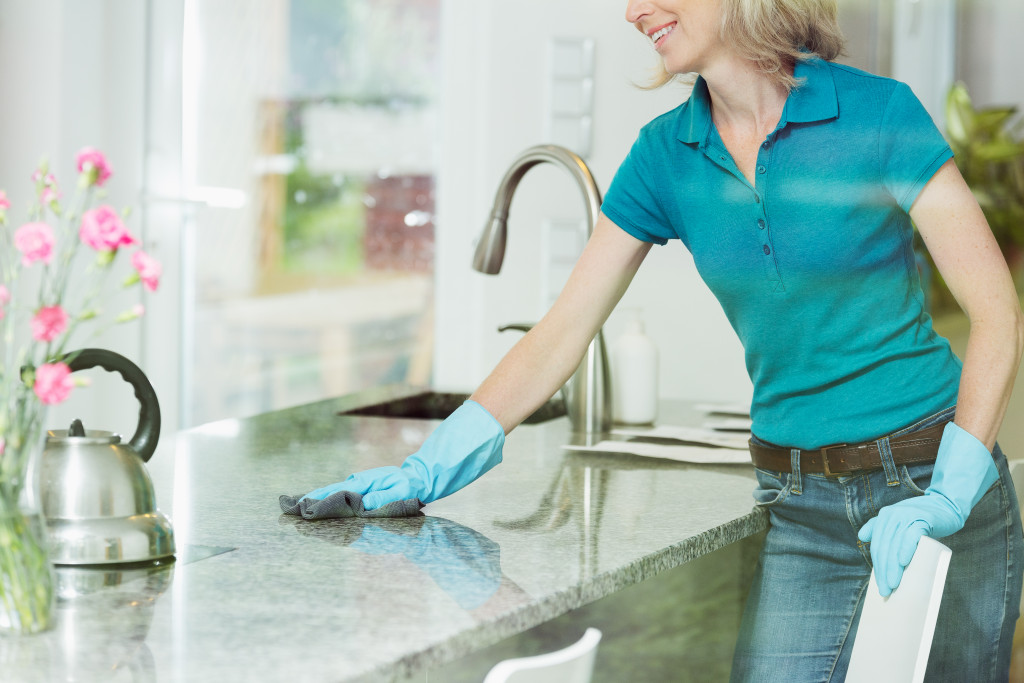Disclaimer: This website provides health information for educational purposes only and is not a substitute for professional medical advice, diagnosis, or treatment. Always seek the guidance of a qualified healthcare provider with any questions you may have.
- Keeping a clean kitchen is essential for both your health and well-being.
- To ensure good kitchen hygiene, regularly clean surfaces and store food properly.
- A dirty kitchen can cause serious health problems, such as triggering allergies or asthma attacks.
- Invest in a good countertop; granite is best for hygiene as it is non-porous and easy to clean.
- Keep your kitchen organized and wipe down surfaces regularly with a disinfectant spray or wipes.
A kitchen is the heart of a home. It’s where meals are cooked, memories are shared, and family bonds are formed. But it can also be an environment where food-borne illnesses and bacteria can multiply if not kept clean.
To create a safe and healthy kitchen, you must take the necessary steps to reduce the risk of contamination and ensure your kitchen is free from harmful germs.
The Importance of a Clean Kitchen
Keeping a clean kitchen is essential for both your health and your well-being. Not only does it reduce the risk of foodborne illnesses, but it can also help keep you organized and make cooking more enjoyable.
Health Benefits
A clean kitchen is critical to maintaining good health. This means regularly cleaning surfaces, such as countertops and cutting boards, to prevent the spread of germs and bacteria. Additionally, it’s important to store food properly so that it doesn’t spoil quickly or become contaminated with harmful bacteria. Regularly cleaning your kitchen will also help prevent pests such as mice and cockroaches from getting into your food.
Organizational Benefits

A clean kitchen can also be beneficial in terms of organization. When all your dishes, utensils, and appliances are in their proper places, it’s much easier to find what you need when you need it—making cooking much less stressful! It will also save you time because you won’t have to waste valuable minutes searching for an elusive ingredient or utensil. Furthermore, having an organized kitchen makes meal prep much faster and more efficient.
The Health Risks of a Dirty Kitchen
A dirty kitchen is more than just an aesthetic issue—it can also cause serious health problems. Contaminants such as dirt, dust, bacteria, mold, and mildew can accumulate in your kitchen over time if it’s not kept clean. These contaminants are known to trigger allergies or asthma attacks in some people, while others may develop skin rashes or eye irritation from contact with them. Additionally, a dirty kitchen can attract pests like cockroaches and rodents that carry diseases like salmonella.
Creating a Healthy Kitchen
When creating a healthy kitchen, you can take a few steps to ensure it stays clean and germ-free. Here are some tips
Invest in a Good Countertop
The quality of your countertop will make a huge difference in kitchen hygiene. Granite countertops are the most hygienic as they are non-porous and won’t absorb liquids or bacteria. Plus, granite is also very easy to clean—wipe it down with soap and water!
Store Food Properly

Storing items properly in your refrigerator, freezer, pantry, or other storage areas is important to keep food fresh and prevent bacterial growth. Always store raw meats on the bottom shelf of the refrigerator, so they don’t leak onto other food items; this will help prevent cross-contamination between foods and reduce the risk of spoilage or contamination by bacteria.
Keep Your Kitchen Organized
A cluttered kitchen makes it more difficult to keep things clean since dirt can easily accumulate in hidden places like cracks and crevices that may be difficult to reach when cleaning up after cooking or eating meals in the kitchen. Make sure everything has its own place and that all surfaces are wiped down regularly with a disinfectant spray or wipes for extra protection against germs lingering around the house.
Wash Hands Before Preparing Food
Before preparing any meal in the kitchen, it’s always important to wash your hands thoroughly with soap and warm water for at least 20 seconds before handling any ingredients or touching any surfaces that could spread germs throughout your home.
This will help reduce the chance of foodborne illness due to cross-contamination from unwashed hands while also helping maintain good hygiene habits that should be followed daily when working in the kitchen.
The Bottom Line
Creating a safe, clean, and healthy kitchen is essential for maintaining good hygiene practices in your home and creating an environment suitable for meal preparation without risking contamination from germs or bacteria in our everyday lives! Following these tips will help ensure your family stays safe from potential illnesses while making memories around delicious meals cooked together!




